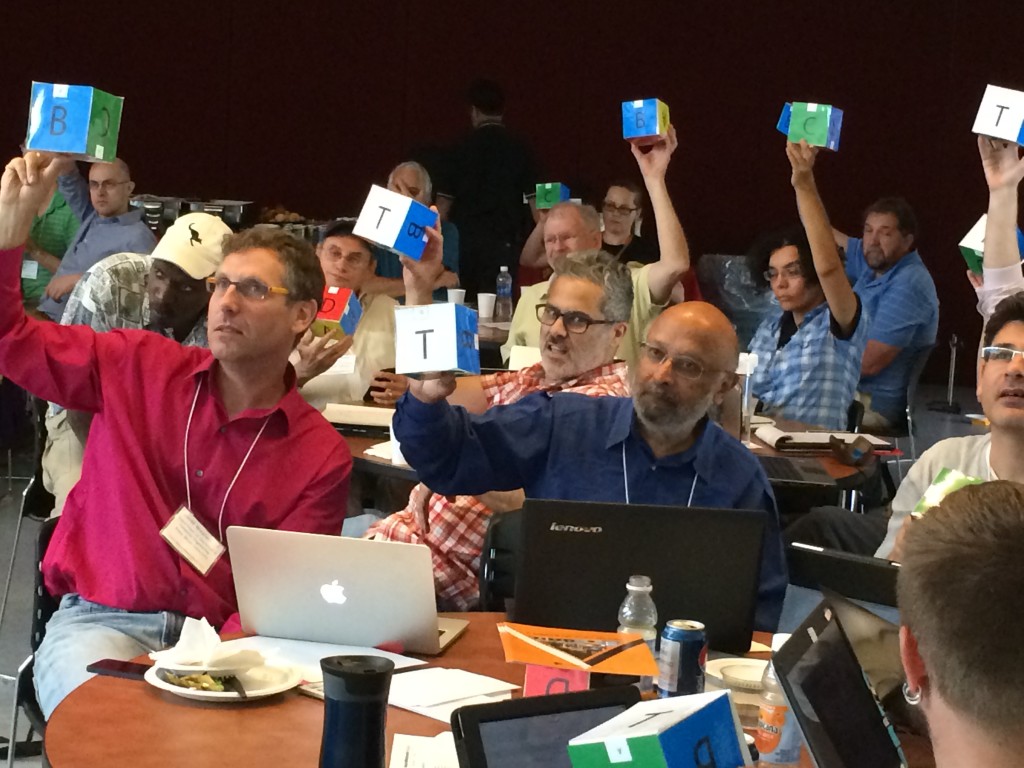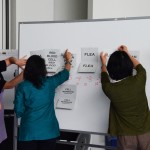Note.. on my computer anyway… this is labeled “Forms for Excel”, not Excel Survey.
Tag Archives: student assessment
Stony Brook University’s first local Summer Institute
Attending the Summer Institute here on campus this week, primarily in the role of technology support and as a representative of TLT, was a really great experience. There were many informative presentations given to prime the participating faculty for the workshop work that they would be diving into, including one given by Jennifer Frederick from Yale University’s Center for Scientific Teaching. The possibly confusing point here, is that while these Summer Institute sessions are all aimed at the departments involved in STEM education, and so therefore you are addressing a room filled with Biologists, Physicists, Mathematicians, Computer Scientists, Chemists, Engineers, etc…. “scientific teaching’ is not about teaching science, but rather teaching using effective methods that have been proven using scientific methodology.
It makes a lot of sense. These are primarily researchers. Don’t stand in front of them and tell them what they are doing wrong in the classroom and how to change it. Show them what years of data have to say about different aspects and strategies in teaching. Show them where they can find out data about the schools that their students are coming from (a great reason to hold these events at an individual institution or region is how you can really drill down to local issues – did you know that no schools in the Bronx even offer Physics in high school? (other than a charter school that doesn’t count because the students that go to that school don’t actually live in the Bronx)).
As soon as studies and data started to be presented to the faculty participating, I could feel them losing up and the defences coming down. They became more comfortable and realized that they were home among their peers.
Structure of the Summer Institutes
Participants:
- Engage in teaching and learning through interactive presentations, mini-seminars, group work, and discussions
- Work in small groups to develop instructional materials for a general topic area
- Design and adapt instructional materials that integrate active learning, assessment, and diversity and that have clear learning goals
- Present and revise instructional materials based on fellow participants’ review and feedback
Three tenets of scientific teaching were explored everyday.
Active Learning (or Teaching)
Diversity
Assessment
Common activity teaching techniques that were demonstrated and then used in the faculty presentations included:
Think – Pair – Share
Student Response Systems (traditional clickers and low tech response cubes)
POE (Predict Observe Explain)
Demonstrations
IMHO the event went very well and CESAME did a great job bring it to SBU. I hope everyone involved was happy with the outcomes and that the participants feel a bit revitalized the next time they are stepping into a classroom.
- Summer Institute 2014
A Flexible Grading Structure
What works for you?
I was talking to a senior lecturer here on campus who shared with me his technique for exam grading, that included an element of self assessment for the involved students.
How this came about, was from students complaining that they didn’t know what his exams were like. He could confidently state that the exams from the past couple of years were on file for them to look at, but he also acknowledged that looking at an exam, and sitting in the room taking it were in fact, two different experiences. SO, instead of stopping there and having a tough sh*t attitude about it, he came up with something I feel is kind of ingenious. They sit in the proctored room, take the test, and then at the very end, make a decision. They either opt to count the exam as 10% of the total grade for the class OR they say don’t count this test and the weight of all of the other forthcoming exams goes up.
And it works. They self assess very well. The ones who opt not to count the exam, typically did poorly, and the ones who count it get decent grades. Plus, they come to the next test far better equipped and have no one to blame but themselves if by the second exam they still fail to prepare properly.
Do you have any grading stories to share with me?






